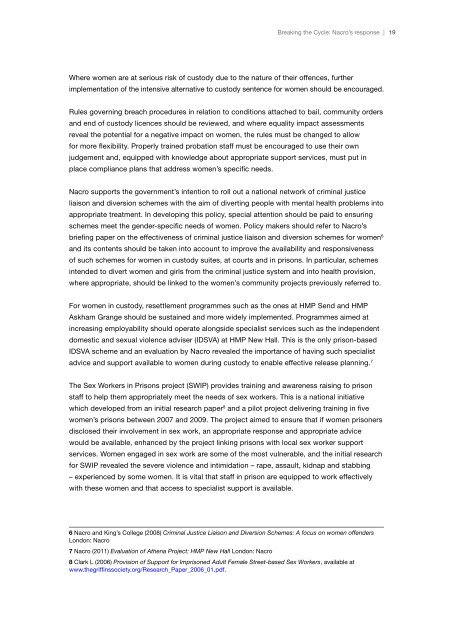Nacro's response to Breaking the Cycle Green Paper
Nacro's response to Breaking the Cycle Green Paper
Nacro's response to Breaking the Cycle Green Paper
Create successful ePaper yourself
Turn your PDF publications into a flip-book with our unique Google optimized e-Paper software.
<strong>Breaking</strong> <strong>the</strong> <strong>Cycle</strong>: Nacro’s <strong>response</strong> | 19Where women are at serious risk of cus<strong>to</strong>dy due <strong>to</strong> <strong>the</strong> nature of <strong>the</strong>ir offences, fur<strong>the</strong>rimplementation of <strong>the</strong> intensive alternative <strong>to</strong> cus<strong>to</strong>dy sentence for women should be encouraged.Rules governing breach procedures in relation <strong>to</strong> conditions attached <strong>to</strong> bail, community ordersand end of cus<strong>to</strong>dy licences should be reviewed, and where equality impact assessmentsreveal <strong>the</strong> potential for a negative impact on women, <strong>the</strong> rules must be changed <strong>to</strong> allowfor more flexibility. Properly trained probation staff must be encouraged <strong>to</strong> use <strong>the</strong>ir ownjudgement and, equipped with knowledge about appropriate support services, must put inplace compliance plans that address women’s specific needs.Nacro supports <strong>the</strong> government’s intention <strong>to</strong> roll out a national network of criminal justiceliaison and diversion schemes with <strong>the</strong> aim of diverting people with mental health problems in<strong>to</strong>appropriate treatment. In developing this policy, special attention should be paid <strong>to</strong> ensuringschemes meet <strong>the</strong> gender-specific needs of women. Policy makers should refer <strong>to</strong> Nacro’sbriefing paper on <strong>the</strong> effectiveness of criminal justice liaison and diversion schemes for women and its contents should be taken in<strong>to</strong> account <strong>to</strong> improve <strong>the</strong> availability and responsivenessof such schemes for women in cus<strong>to</strong>dy suites, at courts and in prisons. In particular, schemesintended <strong>to</strong> divert women and girls from <strong>the</strong> criminal justice system and in<strong>to</strong> health provision,where appropriate, should be linked <strong>to</strong> <strong>the</strong> women’s community projects previously referred <strong>to</strong>.For women in cus<strong>to</strong>dy, resettlement programmes such as <strong>the</strong> ones at HMP Send and HMPAskham Grange should be sustained and more widely implemented. Programmes aimed atincreasing employability should operate alongside specialist services such as <strong>the</strong> independentdomestic and sexual violence adviser (IDSVA) at HMP New Hall. This is <strong>the</strong> only prison-basedIDSVA scheme and an evaluation by Nacro revealed <strong>the</strong> importance of having such specialistadvice and support available <strong>to</strong> women during cus<strong>to</strong>dy <strong>to</strong> enable effective release planning. The Sex Workers in Prisons project (SWIP) provides training and awareness raising <strong>to</strong> prisonstaff <strong>to</strong> help <strong>the</strong>m appropriately meet <strong>the</strong> needs of sex workers. This is a national initiativewhich developed from an initial research paper and a pilot project delivering training in fivewomen’s prisons between 2007 and 2009. The project aimed <strong>to</strong> ensure that if women prisonersdisclosed <strong>the</strong>ir involvement in sex work, an appropriate <strong>response</strong> and appropriate advicewould be available, enhanced by <strong>the</strong> project linking prisons with local sex worker supportservices. Women engaged in sex work are some of <strong>the</strong> most vulnerable, and <strong>the</strong> initial researchfor SWIP revealed <strong>the</strong> severe violence and intimidation – rape, assault, kidnap and stabbing– experienced by some women. It is vital that staff in prison are equipped <strong>to</strong> work effectivelywith <strong>the</strong>se women and that access <strong>to</strong> specialist support is available. Nacro and King’s College (2008) Criminal Justice Liaison and Diversion Schemes: A focus on women offendersLondon: Nacro Nacro (2011) Evaluation of A<strong>the</strong>na Project: HMP New Hall London: Nacro Clark L (2006) Provision of Support for Imprisoned Adult Female Street-based Sex Workers, available atwww.<strong>the</strong>griffinssociety.org/Research_<strong>Paper</strong>_2006_01.pdf.
















